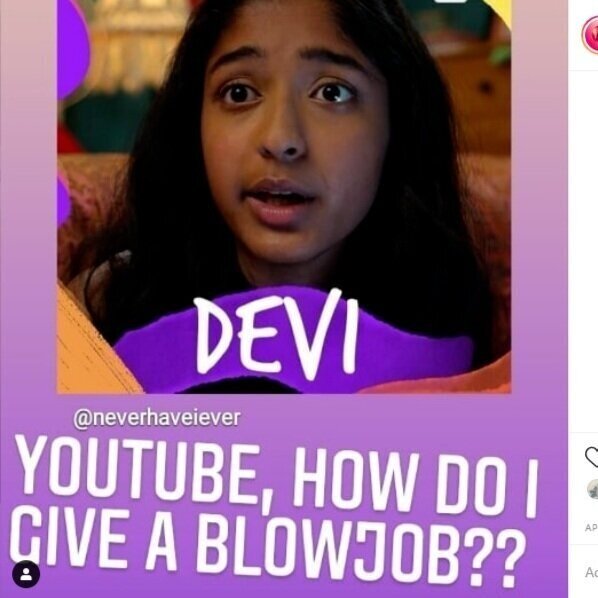by School of Sexuality Education’s gayathiri kamalakanthan.
When I found out that Never Have I Ever centred a Tamil girl exploring her sexuality, I was hyped. Devi’s lines from the trailer could have been lifted from my own secret diaries.
Here’s my reaction the day before the show was released:
Having watched the show, it’s clear that Mindly Kaling, Lang Fisher and their team were big on representation and curiosity around sex. While I embrace the long-overdue representation in Never Have I Ever, it is important to recognise that the show has some problematic themes that could be addressed in season 2.
Monica M, for Wear Your Voice writes that the show ‘furthers old tropes [including] anti-Blackness, casteism, misogyny, islamophobia and fatphobia’. They go on to speak about the ableism, anti-Semitism and colourism also evident within the show. Furthermore, Shivani Persad, for Flare, explores more themes that I have avoided duplicating here. They talk about the reference to indentured servants, different ableism issues, the manipulative pursuit and disposability of Jonah as a gay man and privilege.
Some of these troubling themes, alongside the more empowering ones, create great teachable moments and open up dialogues for viewers and creators alike. As a sex and relationships education facilitator, as well as a practising Hindu, I wanted to map out how we might discuss some of these themes constructively and learn from them.
Part 1 of my response will explore some teachable moments on topics such as communication and sex positivity, the virginity myth, the construction of disability as a problem and casteism. Part 2 will explore themes including Islamophobia, internalised oppression within the south asian community and Tamil identity.
1. Unembarrased communication and sex positivity
Devi: I was wondering if you would ever consider... having sex with me?
(pause)
Paxton: Yh. OK. Just sex right?
Devi: Just sex.
Paxton: I’m down, but I can’t tonight.
Devi: Wow okay!
(episode 1)
I felt uplifted watching this scene. Two young people had communicated about having sex, without shame or coercion. Devi asked for what she wanted, using language and a tone that told Paxton he was free to say ‘no’.
If I were showing this in a classroom, I would ask students what was meant by ‘sex’. Students may respond with ‘penis in vagina intercourse’, and then quickly add in ‘oral sex’, ‘anal sex’, ‘using fingers’, when asked about different bodies, sexualities and preferences. It’s important that we avoid using the word ‘sex’ to imply the heteronormative penis-in-vagina sex that many of us don’t have.
To truly be inclusive of all identities, we need to unlearn the idea that there is one, ‘normal’ way of having sex. Specific communication around what kinds of sexual touching someone finds pleasurable is important to ensure that everyone feels safe and comfortable. Definitions of sex are personal and can include any sexual touching (by ourselves or with others), that arouses us. Bloom’s 4 minute video is a good starter to a more inclusive idea of ‘sex’.
Illustration by Evie Evie Karkera
2. The virginity myth
Devi: Now I want to talk about a major event that could happen this week! Popping my cherry, Doc. The statistical odds that I would lose my virginity to somebody that hot are incredibly low.
(episode 2)
The show has some honest depictions of the pressures that come from the constructs of ‘virginity’ and ‘beauty’. It’s also great that we see Devi discussing her anxieties with her therapist. It tells us that everyone has mental health and helps to open up this taboo subject within the South Asian diaspora. Below is how I would unpack this scene further.
The idea of ‘virginity’ and the ‘loss’ of it is made up by society. It is not fixed in any biological facts and nothing is lost during sexual contact, neither physically nor morally. In an earlier blog post, Katy Elliott writes, ‘The hymen [and therefore ‘cherry-popping’] is a myth. Like many people, I thought a hymen was a stretchy piece of cling film-like membrane which covered the vaginal opening. I thought it was the same for everyone and you could break it by inserting a tampon, riding a horse, or having penis-in-vagina sex. Turns out that isn’t the case.’ She goes on to explain about the vaginal corona - a ring made up of partially covering folds of tissue, that looks different in all bodies, which isn’t ‘broken’ or ‘changed forever’ upon contact.
How someone thinks about virginity (if they do at all) is up to them. They define what is sex for them and whether using a term like ‘virgin’ is useful in their lives.
3. Abuse turns to affection
Ben: We call you the UN because you’re unf*uckable nerds
Later on in the series...
Devi: I wish the Nazis would kill Ben.
(episode 1 and 2)
Ben and Devi, comically characterised as ‘nemeses’ have an emotionally abusive relationship. They intimidate, criticise, publicly humiliate and undermine each other. Ben’s name-calling serves to lower Devi’s self-confidence, self-esteem and perception of her own body image.
Devi’s comment to Ben is violent, anti-Semitic and unacceptable. Arguably, both lines are realistic in the context of the show and demonstrate a common kind of discourse between teenagers. Amanda Silberling, in their article for Alma, writes, ‘I don’t blame viewers who can’t shake off the comment as quickly as Ben does when she apologizes to him. What’s perhaps more potentially harmful than Devi’s comment, though, is the depiction of Ben’s Jewish identity, which rarely feels more developed than these cheap punchlines.’
Turning abusive characters into romantic interests tells young people that humiliation and name-calling is to be tolerated and even expected in relationships. We need to unlearn this all too familiar ‘abuse is redeemed through romance’ trope.
4. Disability constructed as a problem
Eleanor: This is worse than if it were happening to me. In protest, I shan’t use my legs either.
(episode 1)
In the show, Devi suffers from paralysis, where she loses the use of her legs for three months. Then one day, whilst struggling for a closer view of her crush, she suddenly stands and walks. Thereafter, Devi’s disability is often referred back to as a punchline, unchallenged except for a few eye-rolls.
Penny, on their feelingdoughnut YouTube channel talks about the issue of ableism in Never Have I Ever. They say, ‘[Comments about disability in the show] are harmful because it teaches young disabled people that they are a problem, that their disability is a problem that has to be solved in order for them to fit into society...it’s offensive because it implies that we should not be comfortable in our own skin, that we should aim to find a cure; that that should be our life’s purpose...because disability is so horrible.
Based on the social model of disability, Stonewall’s Disability Inclusion Webinar (April 2020) provides more information on how individuals and organisations can ensure better inclusivity.
5. Hindu Nationalism and Casteism
‘Our Pandit in an Uber? What’s next, Prime Minister Modi on Postmates? Over my dead body.’
(episode 4)
I found Nalini’s reverential mention of India’s Prime Minister Narendra Modi shocking. Neither her family nor the priest in the car batted an eye-lid, giving us the impression that this upper caste Brahmin family (like many in real life), revel in their caste privilege and are supporters of India’s right wing BJP party. True to life as this may be, I was expecting more from our leading family.
The line may seem like a throwaway comment, but to many, BJP support is what is tearing India apart. In my attempt to find a silver-lining, I came to the conclusion that we could use this scene to start a dialogue with young viewers on what the U.N. human rights office has called ‘fundamentally discriminatory’ politics.
Since Modi’s re-election in 2019, the BJP have been working hard on delegitimising the citizenship of Muslim Indians and other marginalised groups, by leaning on ideas of ‘caste-purity’ and Hindu nationalism. Among other exclusionary steps, the Citizenship Amendment Act (CAA), passed in December 2019, drives the BJP ideology of a ‘Hindu-only India’. It explicitly seeks to displace India’s Muslim population, as well as making it near impossible for other marginalised groups (including poorer, lower caste, trans and nonbinary hijra communities) to prove citizenship due to lack of access to documentation.
Read further examples of Modi’s and other BJP leaders’ hate speech against marginalised groups.
Of course, it’s important to recognise colonialism’s role in promoting and cementing the Hindu-Muslim conflict. Historian Audrey Truschke explains that ‘the British benefited from pitting Hindus and Muslims against one another and portrayed themselves as neutral saviors who could keep ancient religious conflicts at bay.’ Her research challenges the assumption that ‘the Muslim presence has always been hostile to Indian languages, religions and culture.’ In fact, this ‘more divisive interpretation actually developed during the colonial period from 1757 to 1947.’
We cannot separate ourselves from our politics - and this includes the entertainment we consume in the name of ‘self-care’. Yes, I want representation, but not at the expense of other oppressed groups.
In Part 2 I will explore more teachable moments and what I’d love to see addressed in the next series.
Check out our Teachable Moments resources here.
Support organisations:
Our book ‘Sex Ed: An Inclusive Teenage Guide to Sex and Relationships’ is out now.


